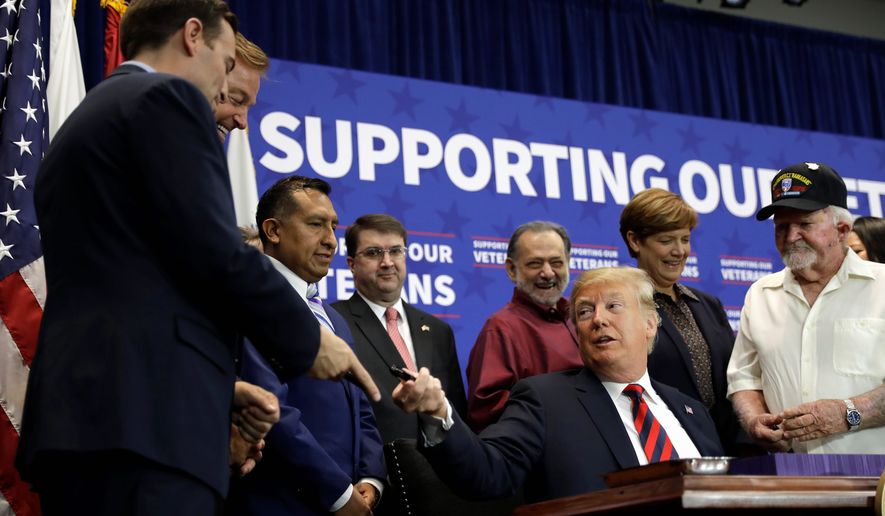President Trump ended the threat of a total government shutdown last week with his signature on a bill to fund several key departments and Congress for all of 2019 — leaving all sides to wonder what comes next.
Mr. Trump’s signature on Friday came just a day after he called a spending bill “ridiculous” because it didn’t apply to the border wall, which is the project he’s most interested in.
He’ll likely get a chance later this week to sign a second spending package for the Pentagon and major domestic agencies handling social services and the education and labor departments.
Though the White House hasn’t committed to signing that bill, congressional leaders say they’re confident Mr. Trump will do so — at which point about 75 percent of the government will be funded for the entire new fiscal year, and there will be stopgap money to keep the rest of the government running into December.
“I just think it doesn’t make a lot of sense to shut down the government,” said Rep. Tom Cole, Oklahoma Republican. “Leadership tells us they’ve been in constant communication with the administration and that we’re proceeding on path, so I assume that’s the case.”
Congressional leaders also announced over the weekend they will include a first round of disaster relief money in a bill they expect to move soon, speeding cash to areas hit by Hurricane Florence.
The quick agreement on disaster money stands in stark contrast with past emergencies, and suggests members of Congress are serious about cooperating to keep the government up and running.
Their chief hurdle is Mr. Trump, and a rump group of conservative Republicans who share the president’s frustration that the GOP isn’t scoring a lot of policy wins in the spending bills.
Mr. Trump, who has been itching for a shutdown showdown over the wall he promised, expressed frustration last week that none of the bills Congress is speeding through ahead of the Sept. 30 end-of-fiscal-year deadline include more money for that purpose.
“I want to know, where is the money for Border Security and the WALL in this ridiculous Spending Bill, and where will it come from after the Midterms?” the president tweeted. “Dems are obstructing Law Enforcement and Border Security. REPUBLICANS MUST FINALLY GET TOUGH!”
A day later, he signed the first package of spending bills with $147 billion in funding for energy, water, veterans affairs, military construction, and congressional programs through September 2019 — approximately one-tenth of the federal government’s discretionary accounts.
Senators last week also passed the bill to fund defense, labor, education and health department needs, on a 93-7 vote. It also keeps other government agencies operating into December. The House is expected to pass that bill this week.
Lawmakers say that if they continue to send Mr. Trump spending bills by overwhelming margins he’ll have essentially no choice but to sign them into law. It requires a two-thirds vote by the House and Senate to override a presidential veto.
But Rep. Nita Lowey, the top Democrat on the House Appropriations Committee, said it can be fruitless at times to try to predict what the mercurial Mr. Trump will do.
“I would assume, given this very important time, that the president would sign it but I can’t say” for sure, said the New York Democrat.
Sen. Ben Cardin said he thinks the looming elections have actually helped the 2019 spending process thus far after years of showdowns and stopgap budgeting, saying GOP leaders don’t want to oversee another government shutdown just before voters head to the polls.
Senate leaders also pledged this year to set aside “poison pill” policy riders that have gummed up the works, and lawmakers got additional money to work with under a two-year budget deal struck in February, greasing the wheels a bit more.
Mr. Cardin said post-election battles over the outstanding spending bills might not be as easy, given the possibility that Democrats could retake control of the House and/or the Senate.
“All bets are off — anything could happen,” the Maryland Democrat said. “We’ll see what happens.”
Congressional leaders do say they’re hopeful that both Houses can pass a $1.68 billion emergency supplemental bill introduced over the weekend that will support recovery efforts associated with damage from Hurricane Florence on the east coast.
“Congress stands with our neighbors affected by this terrible storm, and we extend our deepest sympathies to those who have lost their homes, their livelihoods, and their loved ones,” said House Appropriations Committee Chairman Rodney Frelinghuysen, New Jersey Republican. “This legislation will provide a first round of assistance for the residents who must rebuild their homes, businesses, and lives in the wake of this disaster.”
• David Sherfinski can be reached at dsherfinski@washingtontimes.com.




Please read our comment policy before commenting.